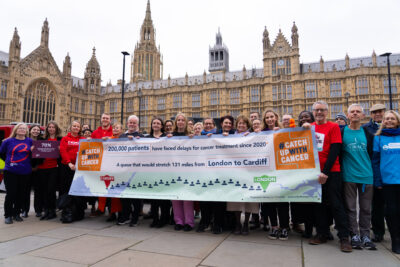Radiotherapy UK and supporters of our #CatchUpWithCancer campaign will gather outside the Houses of Parliament this World Cancer Day (Tuesday, February 4, 2025).
Our new analysis shows that a decade of delays has left more than 500,000 cancer patients waiting too long for treatment.
Read The Guardian coverage here
The Government’s most critical cancer treatment target – the 62-day target from referral to first treatment – has not been met in nearly 10 years. For patients and their loved ones, this almost decade of delays has been devastating. While the Government have promised to produce a cancer plan, international cancer experts have warned that it must be “big, brave, and bold” and not a “tick box exercise” in a new comment piece for The Lancet Oncology to be published later today (Monday, February 3, 2025).
 World Cancer Day 2025
World Cancer Day 2025
On World Cancer Day, Radiotherapy UK and our #CatchUpWithCancer campaign will join over 40 cancer charities, patients, and clinicians: and our patron, football legend and former England captain Bryan Robson OBE, to call for urgent action.
This comes as reports have indicated that the Secretary of State for Health and Social Care has said the Government cannot commit to meeting cancer targets by the end of the Parliament.
Responding to this new analysis, leading oncologist and Chair of Radiotherapy UK, Professor Pat Price said:
“After nearly a decade of deadly delays and systemic failure to treat cancer patients on time, this World Cancer Day must be the turning point. The next ten years must be a decade of decisive action, ensuring every patient gets the timely care they deserve. While the Government has promised to develop a National Cancer Control Plan – something I strongly support – this plan must be big, brave and bold. We can no longer afford to tinker around the edges, and we certainly can’t spend more time developing consultations and calling for ideas. The time to act is now. Any further delay means more patients falling through the cracks and unnecessarily succumbing to this horrific disease. We cannot accept another decade of delays.”
Professor Mark Lawler Professor of Digital Health at Queen’s University Belfast, Chair of the International Cancer Benchmarking Partnership said:
“The data does not lie – we’re lagging behind significantly in our efforts to beat cancer. We need the political will behind a supercharged cancer plan to save thousands of lives. Fifteen years ago, Denmark lagged behind on cancer, as we are now, but an ambitious cancer strategy turned it around. We need to do a Denmark. Research from around the world demonstrates that a cancer plan grounded in intelligence and action, rather than ill-informed opinion saves lives. We are delighted that the data intelligence that we generated seems to have been critical in Secretary of State, Wes Streeting reversing the previous administration’s decision and reinstating a national plan. But we need to act quickly. We won’t wait, cancer patients can’t wait. We want to be leaders not laggers. Let’s be big and bold and brave and deliver an effective national cancer plan we can all be proud of.”
Modern radiotherapy is key solution
The 62-day treatment target, which measures the time from referral to first treatment, is considered the most important sign of how well the NHS cancer pathway is functioning. This target was last met in 2015. The UK now ranks near the bottom of the OECD league tables for cancer outcomes, reflecting the stark reality of this systemic crisis.
In the UK, one patient is diagnosed with cancer every 90 seconds. Over the past decade, approximately every 11 minutes, a patient has missed the treatment target. Without immediate and drastic action, this crisis will only worsen. That’s because there is an expected 30% increase in cancer diagnosis by 2040, and currently our health system is simply not prepared for this further increase in cancer diagnosis.
To address this crisis, investment in modern technologies, particularly radiotherapy, is urgently needed. Radiotherapy is the most cost-effective, highly curative cancer treatment available. Advanced radiotherapy machines leverage innovations such as AI for unparalleled precision and cost just £3,000 to £7,000 per patient—a fraction of the cost of other treatments.
